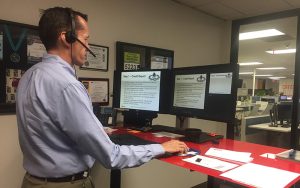PHOENIX – Expect more online scams after the latest online hack at Equifax compromised the personal information of as many as 143 million Americans, Arizona experts said.
The credit reporting service announced the cybersecurity breach in early September, weeks after company officials discovered it on July 29. Bloomberg reported three Equifax executives sold nearly $2 million in stock in early August.

Michael Cocanower prepares to teach a webinar advising consumers after the Equifax data breach. (Photo by Tanner Stechnij/Cronkite News)
Equifax has created a security website detailing the breach and offering advice on follow-up actions for consumers. People’s names, Social Security numbers, birth dates and addresses were among the identifying information that were stolen, the company said.
The Equifax breach is the latest in a series of online hacks that have potentially exposed consumers’ personal information at organizations ranging from the Maricopa Community Colleges to Target.
Phoenix lawyer Tyler Allen, technology consultant Michael Cocanower and itSynergy president Stephanie Netherwood — whose information was compromised in an unrelated online breach — said consumers can take steps to protect their information.
Expect scams to arise out of the Equifax scandal. Don’t fall for them.
Allen said scammers will say, “‘Hey, we’re from Equifax. Give us your information. We think you’ve been breached. We’re here to help.’ The biggest piece of advice I can give is don’t give out your confidential information in email or over the phone.”
Cocanower agreed. “It’s really hard to say what the bad guys are going to come up with. I think that you can assume though there’s going to be a tsunami of scams coming,” he said.
You may have legal recourse if your identity is stolen
“If you are a victim and your identity is stolen by an individual, you’re going to have potential victim’s rights-type claims,” Allen said. “Arizona is a victim’s rights state, so if you are a victim you can have potential restitution and civil claims against Equifax or someone who stole your identity.”
Avoid placing credit information with one agency
Netherwood suggests consumers spread out their yearly free credit reports from Equifax, Experian and TransUnion. “Run your credit reports. You get a free one from each of the bureaus once a year,” Netherwood said. “Stack them, use one every four months and anything you see that you don’t like, get it taken care of right away.”
Determine if you’re a victim of the Equifax attack
Equifax has created a secure website for consumers to enter the last six digits of their Social Security number and their last name to determine if their data may have been stolen.
Equifax also has a security service called TrustedID Premier, which will inform consumers on further actions on how to secure their credit card accounts. They are offering the security program to everyone free for a year. Despite confusing wording in the terms, Equifax has clarified that enrolling in this service does not forfeit users from filing class action lawsuits.
Don’t go through other websites to determine if you were a part of the breach, Allen said.
“Make sure that you are going through the right steps to protect your identity,” he said. “I’m sure Lifelock is getting a huge wave of new clients signing up. What I would say is that you don’t necessarily have to take those steps, but do it if you are concerned.”
Close your account if you’re suspicious
If you see unusual activity on your account, report it immediately and close that account.
Cocanower said consumers should consider whether or not freezing their credit accounts is the right option for them.
“A credit freeze prevents new accounts from being opened in your name,” he said. “However, you can’t freeze and unfreeze in just a moment’s notice. Credit freezes require a fee: it’s $5 per agency to freeze it and $5 per agency to unfreeze it. If you are going to be freezing and unfreezing a lot, that’s going to start to cost you some money.”
Remember the basic protections
Watch your financial and other online accounts regularly. Change your passwords frequently. Make them difficult for strangers to figure out.